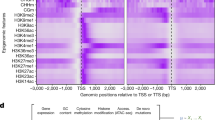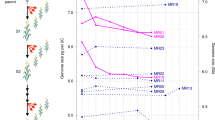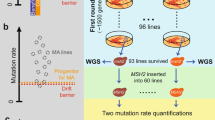Abstract
MUTABLE genes have been intensively studied in maize by McLintock1–3 and Brink4–6 and they occur widely in higher plants7. Among many features of mutable genes, all difficult to explain by conventional mutation theory, the following are especially relevant to the present discussion, (a) One original labile gene often gives rise with high frequency to a whole range of more or less stable alleles, quantitatively graded in their expression. (b) In addition, a labile gene can frequently mutate to other unstable alleles, differing from the original in the timing or frequency of mutation or in the kinds of stable derivatives most often produced, (c) The frequency of mutation is frequently drastically affected by changes of temperature (in several examples higher temperature causes reduced mutation frequency), or by genes elsewhere in the genotype; such variables affect the mutable gene specifically in the sense that they have no evident effect on mutation in general. All these features are well shown in the pallida-recurrens mutable system of Antirrhinum majus8,9. In the following discussion I shall refer to the Antirrhinum mutants because I am familiar with them, although McLintock has documented most of the same effects much more thoroughly in maize.
This is a preview of subscription content, access via your institution
Access options
Subscribe to this journal
Receive 51 print issues and online access
$199.00 per year
only $3.90 per issue
Buy this article
- Purchase on Springer Link
- Instant access to full article PDF
Prices may be subject to local taxes which are calculated during checkout
Similar content being viewed by others
References
McClintock, B., Cold Spring Harbor Symp. Quant. Biol., 21, 167 (1956).
McClintock, B., Carnegie Inst. Year Books, Annual Reports of Dept. of Genetics, 45 (1954–65).
McClintock, B., Brookhaven Symp. in Biol., 18, 162 (1965).
Brink, R. A., Quart. Rev. Biol., 35, 120 (1960).
Brink, R. A., Symp. Soc. Study Develop. Growth, 23, 183 (1964).
Sastry, G. R. K., Cooper, jun., H. B., and Brink, R. A., Genetics, 52, 407 (1965).
Stübbe, H., Bibliographia Genetica, 10, 299 (1932).
Harrison, B. J., and Fincham, J. R. S., Heredity, 19, 237 (1964).
Fincham, J. R. S., and Harrison, B. J., Heredity (in the press).
Callan, H. G., J. Cell. Sci., 2, 1 (1967).
Keyl, H. G., Experientia, 21, 191 (1965).
Ritossa, F. M., Atwood, K. C., and Speigelman, S., Genetics, 54, 819 (1966).
Whitehouse, H. L. K., J. Cell. Sci., 2, 9 (1967).
Holiday, R., Genet. Res. Camb., 5, 282 (1964).
Whitehouse, H. L. K., and Hastings, P. J., Genet. Res. Camb., 6, 27 (1964).
Hayes, W., Proc. Roy. Soc., B, 164, 153 (1966).
Author information
Authors and Affiliations
Rights and permissions
About this article
Cite this article
FINCHAM, J. Mutable Genes in the Light of Callan's Hypothesis of Serially Repeated Gene Copies. Nature 215, 864–866 (1967). https://doi.org/10.1038/215864a0
Received:
Revised:
Issue Date:
DOI: https://doi.org/10.1038/215864a0
This article is cited by
-
Transformations spontanées du mutant nicotinique deux du Coprinus radiatus: Etude de souches nic-2 homothalliques ou diploides
Molecular and General Genetics MGG (1972)
-
An unstable gene in flax
Heredity (1970)
-
The En mutable system in maize
Theoretical and Applied Genetics (1970)
-
Mutable Genes in Maize and Callan's Chromosome Model of Serially Repeated Gene Copies
Nature (1969)
-
Organization of Chromosomes
Nature (1967)
Comments
By submitting a comment you agree to abide by our Terms and Community Guidelines. If you find something abusive or that does not comply with our terms or guidelines please flag it as inappropriate.



